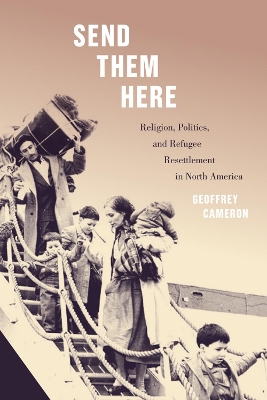McGill-Queen's Refugee and Forced Migration Studies
1 total work
The United States and Canada have historically accepted approximately three-quarters of resettled refugees, leading the world in this key aspect of global refugee protection. Between 1945 and 1980, both countries transformed their previous policies of refugee deterrence into expansive resettlement programs. Explanations for this shift have typically focused on Cold War foreign policy, but there was a domestic force that propelled the rise of resettlement: religious groups.
In Send Them Here Geoffrey Cameron explains the genesis and development of refugee resettlement policy in North America through the lens of the essential role played by faith-based organizations. Catholic, Protestant, and Jewish groups led advocacy efforts for refugees after the Second World War, and they cooperated with each other and their respective governments to implement the first formal resettlement programs. Those policy frameworks laid the foundation for diverging policy trajectories in each country, leading ultimately to private sponsorship in Canada and the voluntary agency program in the United States. Religious groups remain embedded in the world’s most successful refugee resettlement programs.
Send Them Here draws on a rich archival record and extensive comparative research to contribute new insights to the history of refugee policy, human rights, and the role of religion in modern policymaking and global humanitarian efforts.
